
“A Piece of My Mind”
August 2020 Newsletter
Advancing Christian Faith and Values,
Defending Religious Liberty for All,
Supporting Civility and the Common Good
through Preaching, Teaching, Writing, Activism and Reasoned Conversations

Coronavirus—The Necessary Spiritual Ministry
 “Out of lament must come fresh action. At the very least, clergy (properly trained, authorized and protectively clothed) must be allowed to attend the sick and the dying.
“Out of lament must come fresh action. At the very least, clergy (properly trained, authorized and protectively clothed) must be allowed to attend the sick and the dying.
“If secular doctors suppose that such ministry is superfluous, this must be challenged at every level. As we thank God that in the last two or three centuries the long-term calling of the Church to bring healing and hope has been shared in the wider secular world, we must work with the medical profession, not least to ensure a fully rounded, fully human approach. This applies particularly when people are near the point of death…”
– N. T. Wright, God and the Pandemic—A Christian Reflection on the Coronavirus
and its Aftermath (Zondervan, 2020). bold mine.
“Mob•oc•ra•cy”
“Crucify him!” they shouted. “Why? What crime has he committed?” asked Pilate. But they shouted all the louder, “Crucify him!” Wanting to satisfy the crowd, Pilate…had Jesus flogged and handed him over to be crucified.
– Mark 15:13-15 [See also Acts 19:23-41]
The First Amendment to our Constitution, indeed the entire Bill of Rights (amendments 1-10), was intended to limit the power of the federal government over the lives of the people. The people have “free exercise of religion” but the government must not establish an official church. The people have the rights of free speech, a free press, and peaceful assembly, and the right to petition the government for a redress of grievances. Try exercising those rights today in China or in many other parts of the world!
The First Amendment gives the people the right to go into the streets and parks of the city and protest perceived injustices and advocate for change, provided they do so peacefully. The people can put issues on ballots and petition legislatures to enact new laws or revoke existing laws.
What the people must not do is turn the protest into an authoritarian power in its own right. They must not attempt to govern the lives of others through the sheer power of their protest. That would be MOBOCRACY.
A church becomes a mobocracy when a pressure group is able to set rules and priorities, control the worship, get the pastor fired, etc.
Idealists may look on a mobocracy as beautiful people bringing in a season of love. The reality often turns out otherwise. The reality can be death and evil. In the church it is heresy and division.
Gloria Romero, former California state senator and Democratic majority leader, wrote in an op-ed “You Can’t Cancel History” (Press-Telegram, July 5):
Initially, protestors came for the statues and flags symbolic of Confederate racism. But this new reckoning soon expanded into assaults on the framers of the nation itself…
Undoubtedly, founders including Washington and Jefferson were slaveholders and had views unacceptable by standards even then and certainly today… But we cannot ignore their profound role in founding this nation and the profound rights provided us, including free speech and free assembly.
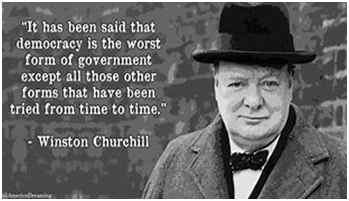 “Mobocracy” is authoritarian and contrary to American ideals.
“Mobocracy” is authoritarian and contrary to American ideals.
1. It often impedes the free movement of other citizens (in so doing, it can be a form of kidnapping).
2. It sometimes destroys the means of livelihood of the very people it claims to represent.
3. It assumes the right to speak for everyone, when in fact it doesn’t (at best, the will of the mob is anecdotal, not a provable manifestation of the will of the people).
4. It tries to force changes without regard to the will of the people.
5. It impedes and may even prohibit the movement of emergency services.
6. It silences, ostracizes, intimidates and even harms those who speak out with opposing views.
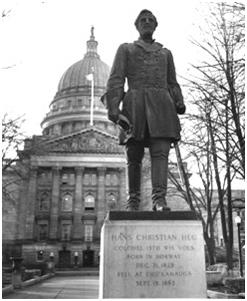 Mobocracy in Action
Mobocracy in Action
The statue of Hans Christian Heg had stood in front of Wisconsin’s Capitol in Madison since 1925. Heg migrated from Norway in 1840. In Wisconsin he joined the anti-slavery Free Soil Party. He was also a leader of Wisconsin’s Wide Awakes, an anti-slave-catcher militia.
He fought on the Union side during the Civil War as part of Wisconsin’s 15th Infantry. After many successful battles against Confederate forces, Colonel Heg was shot while leading his troops in a charge against a retreating Confederate army at Chickamauga, Georgia on September 19, 1863. He died the next day.
On June 23, a mob tore down his statue, dragged it down State St., and threw it into Madison’s Lake Monona.
For more discussion and contrast between democracy and mobocracy: www.difference.wiki/democracy-vs-mobocracy/
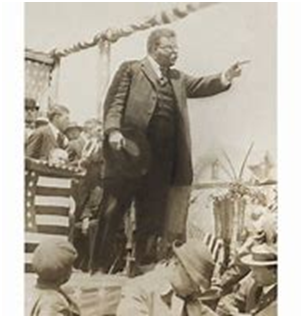 Election Season—Time for Politicians and Citizens
Election Season—Time for Politicians and Citizens
to Learn about
LOGICAL FALLACIES
“Death and life are in the power of the tongue.” – Proverbs 18:21
“When there are too many words, transgression is unavoidable. But he who restrains his lips is wise.” – Proverbs 10:19
Candidates for office and citizens alike may fall for logical fallacies as we choose our sides and pick our political issues and slogans. Some politicians may not care, so long as points are scored on their side. Their use of fallacies may be intentional.
Here are some common logical fallacies. Judge the candidates’ statements and your own words by them.
ARGUMENTUM AD HOMINEM: We besmirch a candidate or fellow citizen instead of dealing with the issues by labeling him or her with a negative (“racist”, “homophobe”, “Commie”, “right-winger”, “Bible-thumper”, “redneck”, “hatemonger” etc.). If we can label someone (“she came from a basket of deplorables”) and make the crowd cheer, we think we’ve won the day.
I once moderated a debate on a hot topic, and at the start I laid out the ground rules. The main ground rule was, “There will be no ad hominem statements.”
ARGUMENTUM AD VERICUNDIAM: A position is supported by reference to some “great, reputable, or prominent source” instead of enlisting rational arguments and proof to support a position. (“The Bible says…” or “Martin Luther King said…” or “The Science says…”)
The Bible is the final authority for many people, but in the world of political debate the arguments must go beyond this (they can certainly include it).
ARGUMENTUM AD POPULUM: Join the bandwagon! The argument must be true because so many people believe it is true. After Lyndon Johnson trounced Barry Goldwater in the 1964 elections, many Goldwater supporters began to declare (quite absurdly), “27 Million Can’t Be Wrong!”
There’s the “consensus of experts,” or “The Silent Majority,” or “the People” who supposedly speak for all (happens in churches too!).
ARGUMENTUM IGNORANTIAM: This approach tries to throw the burden of proof on the other candidate. Often the item being debated can’t be proved or disproved this way (how can you prove a negative?). Actually, the one who makes an assertion has the burden of proving it, rather than the opponent having to disprove it.
POST HOC, ERGO PROPTER HOC: This is the “causal” argument. If “B” follows “A”, then “A” is the cause of “B”. Unemployment went down after the tax cut, therefore the tax cut was the cause for the lower unemployment rate, or “They took prayer out of our schools and our country’s moral values went to hell in a basket.” Did the former cause the latter? Maybe, maybe not. Societal dynamics are very complicated.
ACCIDENT AND ITS CONVERSE:
ACCIDENT: Arguing from a general rule to a particular case. (We extend general positives or negatives about a particular societal group, like a political party, to every member of that group.)
CONVERSE: Arguing from a particular case to a general rule. (Current critics of police frequently risk making this error.)
God gave us minds to think. God is the author of logic. I’ve long thought that every pastor should receive training in logic while in seminary (a course in ethics wouldn’t hurt either).
Politicians and activists could brush up on logic too. Sadly, in the political
world it’s the victory that counts, not the high road to the victory.
Let’s revolutionize political discourse by exposing fallacious claims.
“Each of you must put off falsehood and speak truthfully to his neighbor.”
– Ephesians 4:2
Religious Liberty Vigilance – Four Courtroom Victories and One Defeat for Religious Liberty
Note: These are quick summaries. For details go to: supremecourt.gov for cases 1-4.
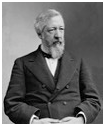 1. Espinoza v. Montana Department of Revenue
1. Espinoza v. Montana Department of Revenue
The late 1800’s were a time of anti-Catholic bias. James C. Blaine proposed a constitutional amendment in 1875 that would have prohibited direct government aid to educational institutions that have a religious affiliation (primarily Catholic schools, many of them with large immigrant populations). Though the federal amendment failed, thirty-eight states later adopted features of “Blaine” in their state constitutions. Montana was one of these.
In “Espinoza” the U.S. Supreme Court ruled that if the state made funds available to private schools it could not exclude private religious schools solely because they were religious.
2. Our Lady of Guadalupe School and St. James School (combined cases)
The First Amendment protects the right of religious institutions “to decide for themselves, free from state interference, matters of church government [employment] as well as those of faith and doctrine.” – Justice Alito, writing for the majority of the U.S Supreme Court.
3. Little Sisters of the Poor v. Pennsylvania
The U.S. Supreme Court ruled that this Catholic agency could not be required to cover contraception in its insurance coverage since to do so violated core beliefs.
4. Calvary Chapel Dayton Valley v. Steve Sisolak, Governor of Nevada
Voting 5-4, the Supreme Court denied injunctive relief to the church, letting stand policy that allows casinos to have much higher occupancy for gambling than churches can have for worship. Justice Kavanaugh said in dissent, “Nevada’s rules reflect an implicit judgment that for-profit assemblies are important and religious gatherings are less so; that moneymaking is more important than faith during the pandemic.”
5. Steven Soos et. al., v. Andrew M. Cuomo et. al.
A judge for the U.S. District Court, Northern Division of New York ruled that Gov. Cuomo and NYC Mayor de Blasio could not impose limits on church attendance unequal to what applied to protests. Judge Gary Sharpe said de Blasio had “simultaneous pro-protest/anti-religious gathering messages” when he “actively encouraged participation in protests and openly discouraged religious gatherings and threatened religious worshipers.”
Bible Insight –
The Imperatives of “Coming Together”
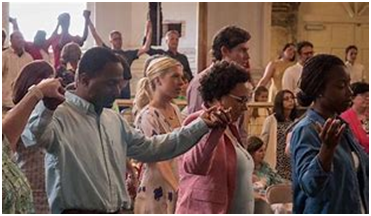 Let us consider how to stir up one another to love and good works, not neglecting to meet together, as is the habit of some, but encouraging one another, and all the more as you see the Day drawing near.
Let us consider how to stir up one another to love and good works, not neglecting to meet together, as is the habit of some, but encouraging one another, and all the more as you see the Day drawing near.
– Hebrews 10:24-25 ESV
In this text we learn several lessons about “The Gathering”:
1. Some had abandoned the church, leaving their faith behind. This isn’t talking about staying away from gatherings because of a government edict, but because of personal apostasy. Government edicts against worship are from antichrist powers outside the church. Apostasy is from antichrist power within the church.
2. Nonetheless, we see how indispensible gathering together is. It is a context where we “stir up one another to love and good works” through teaching, example, and ministries. The phrase “not neglecting to meet together” is a dependent clause. It explains how the command to “stir up one another to love and good works” is to be obeyed. Other scriptures expand on “gatherings” (especially 1 Corinthians 10-14).
3. We encourage one another in the gathered assembly—even increasing this activity in difficult times. As the Day of Judgment (unknown) draws near, we intensify our gatherings all the more.
Hebrews 10:24-25 dare not be missed during the present coronavirus shutdowns and limitations. We can have services and sermons on TV and radio and on-line and listen to Christian music through our earbuds. But these can only be temporary and partial substitutes for the real thing (forms of “the church in exile”). We should do all within our power (safety efforts and social activism) to re-enable “The Gathering” in its fullness ASAP.
FOUR IMPERATIVES should govern every church’s worship:
1. We must GATHER (Hebrews 10:25; Matthew 18:15-20)
Jesus spoke of his presence with “two or more gathered in my name”. In context, Jesus wasn’t speaking of some Christian friends getting together, but the church exercising spiritual authority as a gathered body.
The Book of Acts shows gatherings (2:42-47; 20:7). Two Greek words also underscore the gathering of believers. ““Sunagōgē” (“the gathering”) – James 2:2; (compare Luke 4:16-21). “Sunerchomai” (“to come together”) appears to be a technical verb describing believers gathered to celebrate Communion and to minister to one another through their spiritual gifts (1 Cor. 11:33, 14:26).
It’s high time we left behind the privatistic “God and me” songs (“I come to the garden alone, while the dew is still on the roses…and He walks with me and he talks with me…”) and committed ourselves to the biblical concept of gathering together for worship in the presence of Christ, energized by the Holy Spirit (“We gather together to ask the Lord’s blessing; He chastens and hastens His will to make known; The wicked oppressing now cease from distressing; Sing praises to His Name; He forgets not His own.”).
2. We must SING (Ephesians 5:18-19; Hebrews 13:15)
If you survey the Psalms and portions of the New Testament you’ll see that singing is a natural feature of God’s people gathered. Indeed, a mandate.
“There is something mysteriously fortifying about the act of singing together. Oral and chest cavities vibrating in rhythmic unison—which is all corporate singing is—create a peculiar companionship among people who, apart from their creed, may have little else in common.” – Barton Swaim, “O for a Thousand Tongues to Sing,” The Wall Street Journal, July 3, 2020.
Add to this an encounter with The Living God in corporate worship. In the context of “The Gathering” we experience the Holy Spirit’s power, energizing worship and making it the powerful experience it is. We must reject secular mandates that tell us not to sing. However, we can adapt our singing to ensure the protection of worshippers (we won’t be able to sing the really robust songs, at least for a while, and we won’t “stand and sing out”).
3. We must TOUCH – some examples of “touch” in worship and ministry:
“The Gathering” is spiritual as opposed to worldly, not as opposed to physical. The physical nature of worship is seen especially in the act of touching:
Touching the sick – Matthew 8:3, 15; 9:29; 20:34
Touching the fearful – Matthew 17:7
Baptism – Acts 19:5-6
The “Holy kiss” – 1 Thess. 5:26; 1 Peter 5:14
Praying together and embracing – Acts 20:36-37
Washing one another’s feet – John 13:14
Extending “the right hand of fellowship” – Galatians 2:9
Anointing the sick with oil – James 5:14
Laying on of hands – Acts 9:17; 19:6; 28:8; 1 Timothy 4:14; 5:2
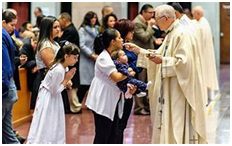 4. We must PARTAKE (receive Communion—
4. We must PARTAKE (receive Communion—
1 Corinthians 10:16-17; 11:23-24)
In “The Gathering” we partake of the Communion of the Bread and of the Cup, proclaiming in an unparalleled way the death of Jesus in our behalf and for our forgiveness. One way to observe Communion is in the context of a Fellowship Meal.
Some localities have tried to ban Communion. This must be resisted. Eastern Orthodox churches have declared they cannot submit “to the authorities of this world when the Divine Eucharist is called into question.” This is the correct position.
The psalmist lamented his forced absence from “The Worship Gathering”. Let’s join his lament, and do all we can to make the exile a thing of the past.
These things I remember, as I pour out my soul:
how I would go with the throng
and lead them in procession to the house of God
with glad shouts and songs of praise,
a multitude keeping festival. – Psalm 42:4
Remembering August, 1945 – 75 years ago

The U.S. Olympic runner Louis Zamperini was a POW in a camp in Japan. The POWs spread news among themselves that they would all be executed later in August lest they be liberated and tell their horror stories (37% of over 36,000 POWs died while in captivity under Japanese control—that’s over 1 in 3).
But on August 15 good news came early when conflict stopped. On that day POWs found their camp eerily empty of guards. The guards were all huddled in a building listening to the Emperor on radio. “The Emperor has brought peace to the world,” a camp commander later said.
Actually, two atomic bombs, August 6 over Hiroshima and August 9 over Nagasaki, brought the war to a rapid end.
The arguments for and against the bomb have remained about the same over the years. American military leaders expected casualties to be well over a million when troops invaded the Japanese homeland to finally defeat Japan.
On August 29, 1949 the Soviet Union successfully tested its own atomic bomb and the face of atomic weaponry changed forever. For decades the U.S. and the U.S.S.R. essentially had an atomic standoff. At least they understood each other. Today atomic weapons are in the hands of many nations, some rogue. Some kind of nuclear conflict is more likely now than ever before. Had the U.S. NOT used the atom bomb to end WWII, this wouldn’t be any different today.
Sources: Unbroken (story of Louis Zamperini) by Laura Hillenbrand;
Countdown 1945 by Chris Wallace; Three Days in January by Bret Baier, pages 58-59.
Another Voice… “Prayer for America” (weekend of July 4)
By Bob Wriedt, Senior Pastor of Grace Community Church of Seal Beach
 This weekend is the 244th anniversary of the signing of the Declaration of Independence. Normally, we don’t make a huge deal of patriotic holidays in worship, because it is not the role of the church to celebrate national holidays.
This weekend is the 244th anniversary of the signing of the Declaration of Independence. Normally, we don’t make a huge deal of patriotic holidays in worship, because it is not the role of the church to celebrate national holidays.
But this year there is so much hurt, anger, and longing among our community and nation that it is a ripe opportunity to cry out to God. Additionally, all of us need help cultivating a theology of Christian citizenship that will work in the modern-day.
Unfortunately, the models of Christian citizenship most often presented in our culture are at the political extremes. Is there a way we can pray together as a diverse Christian community?
One of the reasons why praying together for our country is difficult is that we often disagree about who “America” is. Specifically, there is a divide between older and younger evangelicals in the US about whether America is more like the biblical model of Israel or Babylon.
For many older American Evangelicals (though not all, of course), our country reminds them of Israel. They remember how God has used America to bring hope, freedom, and the gospel throughout the world. They recognize the deep religious faith of many of the founders and the ways America seemed like the promised land to them. They celebrate the willingness of the American people to sacrifice to bring freedom and democracy in the face of fascism and communion, even at the cost of war. They resonate with Abraham Lincoln’s description of America as the “last, best hope of earth” and see our current cultural moment as the point that where that hope will be either saved or lost (as did Lincoln himself). They are concerned about America facing the same exile and wilderness that Israel faced in the Babylonian captivity. For them, America is losing its essential quality as a Christian nation.
For many younger American Evangelicals (though, again, not all), our country reminds them of Babylon. They see the way that Babylon enslaved and slaughtered people they conquered and they see America’s shameful history of the same. They see how Babylon used their military to enrich itself at the expense of other people, using their offer of freedom as a pretext for extortion, and overlay American foreign policy. And they are concerned that even as Babylon misunderstood themselves as impenetrable, America is on a similar path to divine judgment. For them, America has never lived up to being known as a Christian nation.
So, who is right? Is America Israel or Babylon? Neither. America is America.
A sign of mature Christian thinking is the capacity for avoiding false dichotomies. (Think about Solomon’s wisdom with the baby, Jesus with the challenge over taxes, or Paul’s response to the question of circumcision.) When we put only two options on the table and say, “You have to choice A or B,” as if they are the only potentialities, we rob ourselves of seeing the broader complexity God offers.
Do we need to say, “Israel or Babylon”? We are certainly not the unique covenant people of God. But that does not mean that we need to assume the opposite is true.
To have an honest and fully Christian view of America, we should thank God for many aspects of how God has blessed America. It would be ungrateful and ahistorical to act as if God has not blessed America. And yet glossing over our many sins as a country is neither honest nor pious. There are also many things we should be ashamed of in our country’s past and present. The presence of one does not need to deny the other.
So, how does a church of both younger and older Christians pray together on the fourth of July? I think the best way is to pray together for revival.

New Pastor at Los Altos Brethren Church – Long Beach Press-Telegram
50 Years Ago!
To use an old “Disneyland” phrase, my life in California has been an “E-Ticket” all the way!
• Six years as pastor at Los Altos Brethren Church.
• Eight years teaching theology at Biola University.
• Twenty-eight years as Senior Pastor of Grace Community Church of Seal Beach.
• Chaplain for the Seal Beach Police Department since 2001.
• Opportunities for ministry impact locally, regionally and nationally.
• Active retirement, serving as Pastor Emeritus at Grace Community.
• 54 wonderful years of marriage, two children and six grandchildren, who all make us proud.
¡Gracias a Dios!

